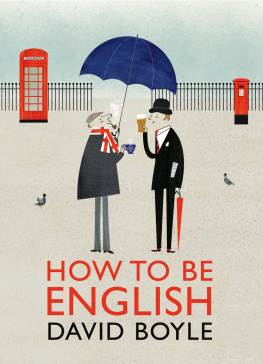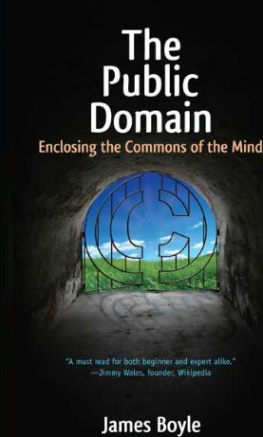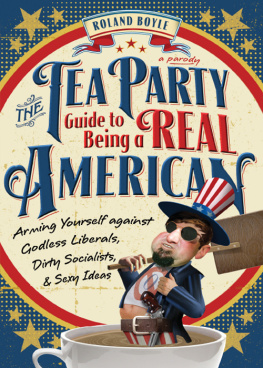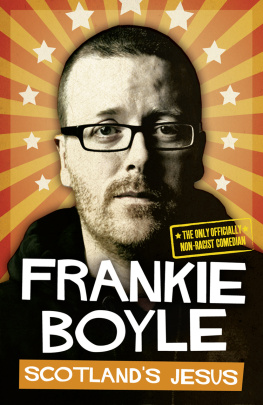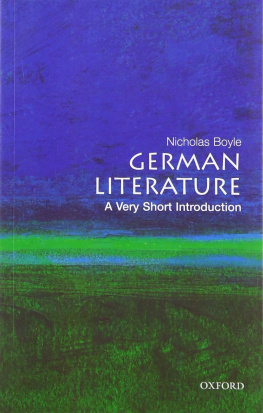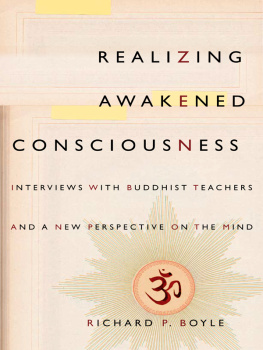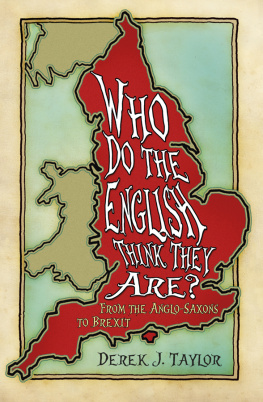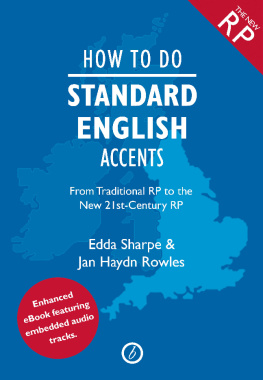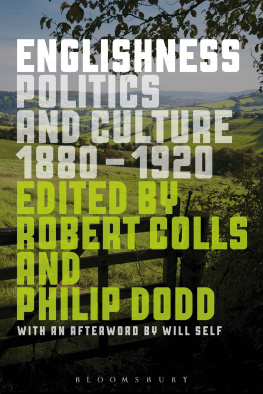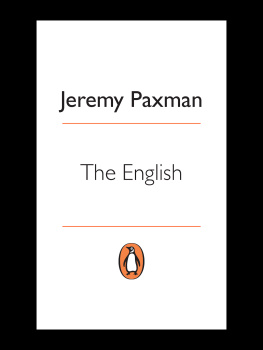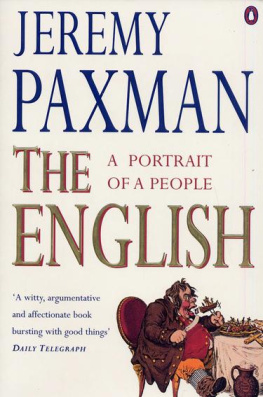Contents
ABOUT THE BOOK
English culture is confused, muddled and often borrowed. The purpose of this book is to give the reader a complete grounding in the idiosyncrasies of the English and to pin down the absurdities and warmth of Englishness at its best.
Featured in this book are such established English cultural behemoths as the Beatles, Big Ben and the Last Night of the Proms alongside less celebrated quirks such as meat pies and the working mans haven, the allotment. Here we celebrate the bell-ringers and Morris dancers, bowler hats (the symbol of respectable Englishness) and cardigans (symbol of staid middle-class solidarity). We examine the brutality of Punch and Judy and our historic love of fairies, once so much a part of the English psyche that they were described as the British religion.
At once fond and irreverent, laudatory and curious, How to Be English might just teach us how to be English once again.
ABOUT THE AUTHOR
David Boyle is the author of a series of books about current affairs and history, including Blondels Song, about the imprisonment of Richard the Lionheart, Toward the Setting Sun, about the discovery of America, and Eminent Corporations, about the BBC, Barclays and other great English companies. He has carried out an independent review for the Treasury, he has stood for Parliament, worked for think-tanks and written widely in the UK media. His most recent book was Broke: Who Killed the Middle Classes? (Fourth Estate).
Contents

In memory of my wonderful grandparents
INTRODUCTION
DINNER WAS ANNOUNCED soon after our arrival, which consisted of the following things, wrote Rev. James Woodforde describing his meal on 20 April 1796, in a diary which in a very English way describes food in great detail but barely mentions God at all. Then he takes a deep breath and sets out the table before him:
Salmon boiled & Shrimp Sauce, some White Soup, Saddle of Mutton rosted & Cucumber &c., Lambs Fry, Tongue, Breast of Veal ragoued, rice Pudding the best part of a Rump of Beef stewed immediately after the Salmon was removed. 2nd course. A Couple of Spring Chicken, rosted Sweetbreads, Jellies, Maccaroni, frilld Oysters, 2 small Crabs, & made Dish of Eggs We got home about half past nine, as we went very slowly on Account of Britons walking, who was very imprudent indeed, but I believe he had been making too free with Mr Mellishs Beer &c.
There is a glimpse here, perhaps, of the soul of the English. We have a culture like a rummage sale, like a white-elephant stall, hideously divided and bizarrely coherent and, over the last century or so, obscured by an even more varied invention known as Britishness. The British have a terrible reputation for cuisine, but the English have a different reputation: for overindulgence, and plain, gargantuan portions.
That is the way the English used to eat, and I have a feeling they would do again, given the chance. There is a little of the overindulgent eighteenth century in all of us. Perhaps not in our genes; there are so many people here and always have been from other parts of the world. With the best will in the world, there is no way they can share the particular mixed English genetic heritage. Nor is it quite the English environment and weather which we all share that shapes us, because the weather has changed from the heat of the twelfth century to the frost fairs on the Thames of the eighteenth.
No, it must be something else some other historical imperative, some psychic beating of the traditional heart of the land perched on the far north-west corner of Europe, peering out towards the west. Something shapes the English it does not homogenise them, which would not be English at all but it makes them stand out, whether they like it or not, whether they are from the backstreets of Karachi or the tiny Jewish villages of old Poland. We cant know what that is, but we can look at the flotsam and jetsam of history that amount to the whole.
This book that you hold in your hand tries to gather up some of those strands. As such, it is both a celebration and investigation of Englishness and an instruction manual for those who might like to be more English. It is also a guidebook for those of us who are not absolutely sure who we are.
And the confusion is only reasonable. The English themselves are a pretty diverse bunch and there are many different kinds of English people, even among the same social strata. Take the two great English heroes of the Napoleonic era, Nelson and Wellington (Nelson was from Norfolk, though Wellington was, strictly speaking, Irish). They only met once, in the lobby of the Colonial Office in Downing Street, shortly before the Battle of Trafalgar in 1805. They disliked each other on sight. Wellington said Nelson was vain and silly; Nelson didnt survive long enough to write about his own feelings. It was only because Lord Castlereagh kept them waiting for three quarters of an hour that there was any kind of meeting of minds.
This misunderstanding is usually explained in terms of a difference in career and timing. Nelson was at the height of his fame and Wellington, then Sir Arthur Wellesley, was not yet a national hero, and he felt ignored and patronised by the little one-eyed, one-armed admiral. But there is another way of looking at why they annoyed each other. Because although they represented the same nation, they could not have had more contrasting personalities, And because Wellington virtually invented the new British personality, adding to the traditional English reputation for phlegm a whole new veneer that was all his own tight-lipped, unemotional, clipped.
My God, Ive lost my leg! shouted the Earl of Uxbridge, later Marquess of Anglesey, next to Wellington at Waterloo, after a cannonball carried it away at the height of battle.
Wellington glanced down, unsurprised and unrelenting. By God, sir, he said. So you have.
Nelson, on the other hand, was easily a match for Wellington for his strategic genius and personal bravery, but he represented a much more old-fashioned personality emotional, overindulgent, sentimental, lachrymose, and overwhelmingly English. Wellington was never any of those. No wonder they disliked each other to start with.
So what is it to be English? Is it by turning a Nelsonian blind eye to authority or is it the Wellingtonian stiff upper lip? Is it a sentimental attachment to animals, is it a fondness for some of the most magnificently horrible vegetables on the planet, is it a nostalgic regard for tradition, or is it our love both of the monarchy and of the underdog? Probably it is a mixture of all these things.
These are increasingly urgent questions. The Scots and Welsh are clear about who they are, and are aware of themselves as nations in the United Kingdom. Their demands for self-determination are, to some extent, being met. They are grown-up countries, not vassals. But who are the English? The Scots have Flower of Scotland; the Welsh have any number of songs including Cwm Rhondda and Myfanwy and Well Keep a Welcome. The Irish have their own ambiguities, it is true, but what do the English have, except a vague, polite on-the-one-hand-on-the-other-hand?
This is partly because the English have always been polite. The English have always apologised for themselves wherever they go. They like pluck, fair play and cricket. Wimbledon and the Derby still have a place in their hearts, but there are peculiar ways in which they feel most comfortable not winning. They also dont like articulating what they are, in case someone contradicts them. This is partly political correctness the nation is so diverse, so multiracial, so contradictory but it is more than that. They have always expressed themselves and articulated their values in deliberately ambiguous ways and who can say they are wrong? But it does leave a bit of a gap.

